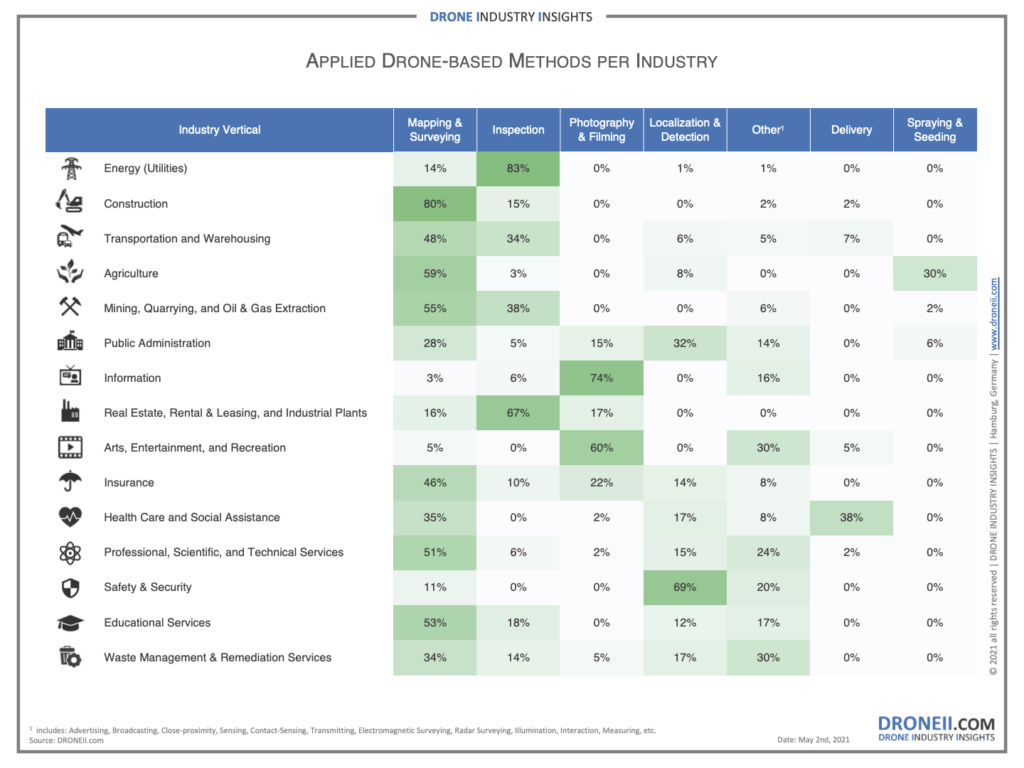Many drone companies trying to pinpoint their marketing efforts have asked how drones are used on jobsites. Now, thelatest report from Drone Industry Insights (DRONEII) has the answer: from surveying to security, the Drone Application Report 2021 lists 237 different commercial application examples.
Some companies focus on sectors: public safety, energy, or construction. It’s an approach that makes sense: enterprise companies often purchase from partners that they know. Within those sectors, however, are a wide variety of ways that commercial drones can be applied: and some require different features and accessories to be performed optimally. How exactly are enterprise customers in each sector using UAV? Pinpointing those applications could help manufacturers and partners develop the right sensors and software for each job. “Whether it’s Germany, Sweden, Brazil or Malaysia, drones are innovating business development in a similar way to what smartphones started to do in the early 2000s, and the key is neither hardware nor software but a combination of these into a valuable application,” writes DRONEII’s Ed Alvarado.
The Top Commercial UAV Applications
In the energy industry, DRONEII finds that the top UAV applications center around inspections: in construction, surveying and mapping is the primary use. Both sectors use the technology for both purposes, however – as well as a variety of other uses, including the emergence of drone delivery on some construction jobsites.
“In the Energy sector, roughly 83% of the time drones are used to carry out inspections that could be life-threatening to a human or would cost companies millions of dollars in lost revenue…. Another industry where drones are mostly used for inspections is Real Estate, Rental & Leasing, and Industrial Plants (67%),” Alvarado writes.
“Meanwhile, in Construction, drones are mostly (80%) used for mapping and surveying (e.g. aerial planning, inventory management, topographic mapping, 3D reconstruction of sites or ongoing construction projects). This enhances worker safety, provides digital data that was not available before, makes project management more efficient, and speeds up projects while decreasing cost in terms of time and money.”
While UAV technology and sensors are often multi-purpose, more and more sophisticated software allows industries to integrate drone technology into their existing workflows. The data indicates change- the once absolutely dominant “Photography and Filming” now is the central application for only a handful of industries. As the ecosystem of AI-powered software, lightweight sensors, accessories and automated hardware expands, so will the number of commercial applications.
Miriam McNabb is the Editor-in-Chief of DRONELIFE and CEO of JobForDrones, a professional drone services marketplace, and a fascinated observer of the emerging drone industry and the regulatory environment for drones. Miriam has penned over 3,000 articles focused on the commercial drone space and is an international speaker and recognized figure in the industry. Miriam has a degree from the University of Chicago and over 20 years of experience in high tech sales and marketing for new technologies.
For drone industry consulting or writing, Email Miriam.


